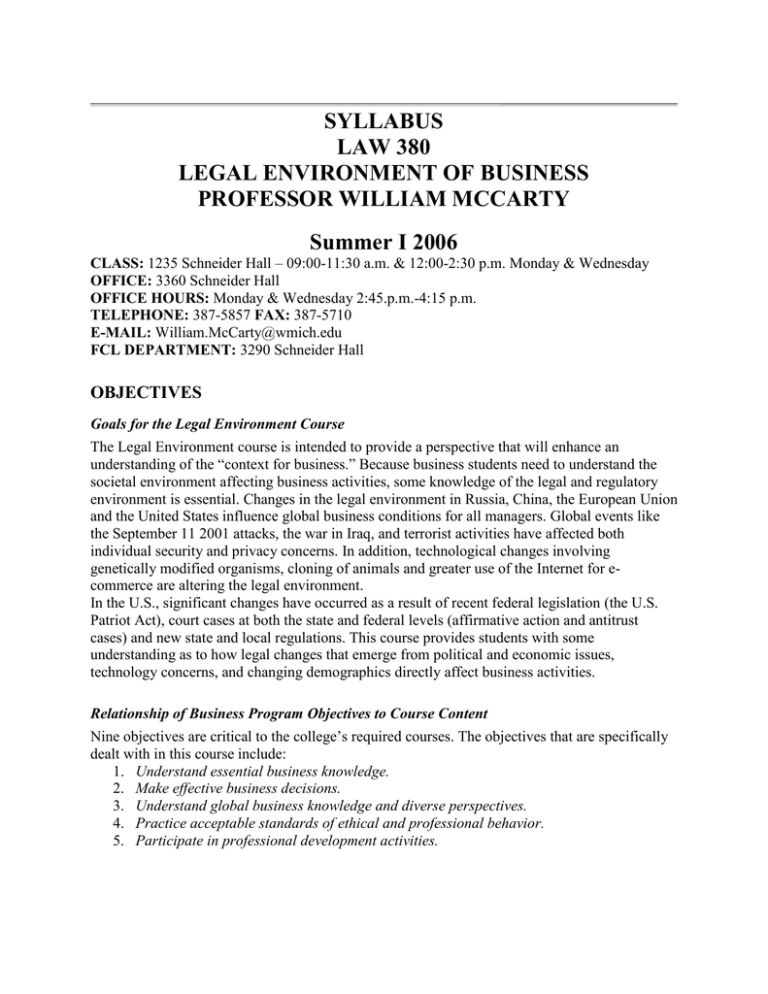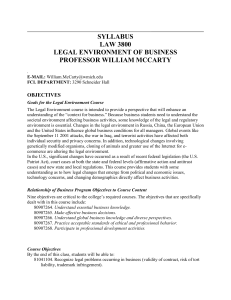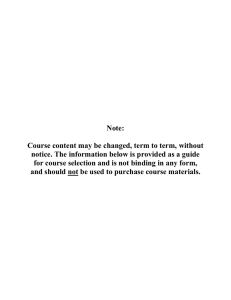SYLLABUS LAW 380 LEGAL ENVIRONMENT OF BUSINESS PROFESSOR WILLIAM MCCARTY
advertisement

SYLLABUS LAW 380 LEGAL ENVIRONMENT OF BUSINESS PROFESSOR WILLIAM MCCARTY Summer I 2006 CLASS: 1235 Schneider Hall – 09:00-11:30 a.m. & 12:00-2:30 p.m. Monday & Wednesday OFFICE: 3360 Schneider Hall OFFICE HOURS: Monday & Wednesday 2:45.p.m.-4:15 p.m. TELEPHONE: 387-5857 FAX: 387-5710 E-MAIL: William.McCarty@wmich.edu FCL DEPARTMENT: 3290 Schneider Hall OBJECTIVES Goals for the Legal Environment Course The Legal Environment course is intended to provide a perspective that will enhance an understanding of the “context for business.” Because business students need to understand the societal environment affecting business activities, some knowledge of the legal and regulatory environment is essential. Changes in the legal environment in Russia, China, the European Union and the United States influence global business conditions for all managers. Global events like the September 11 2001 attacks, the war in Iraq, and terrorist activities have affected both individual security and privacy concerns. In addition, technological changes involving genetically modified organisms, cloning of animals and greater use of the Internet for ecommerce are altering the legal environment. In the U.S., significant changes have occurred as a result of recent federal legislation (the U.S. Patriot Act), court cases at both the state and federal levels (affirmative action and antitrust cases) and new state and local regulations. This course provides students with some understanding as to how legal changes that emerge from political and economic issues, technology concerns, and changing demographics directly affect business activities. Relationship of Business Program Objectives to Course Content Nine objectives are critical to the college’s required courses. The objectives that are specifically dealt with in this course include: 1. Understand essential business knowledge. 2. Make effective business decisions. 3. Understand global business knowledge and diverse perspectives. 4. Practice acceptable standards of ethical and professional behavior. 5. Participate in professional development activities. Course Objectives By the end of this class, students will be able to: 1. Recognize legal problems occurring in business (validity of contract, risk of tort liability, trademark infringement). 2. Comprehend how the United States’ legal system influences business activities (relationship of federal and state courts, knowledge of trial procedures, selection of alternative dispute processes). 3. Demonstrate the ability to apply legal analysis principles to solving problems and making effective business decisions (determination of relevant facts, identification of issues, use of inductive reasoning). 4. Recognize the differences among various global legal systems and appreciate how those differences affect behavior in different cultural circumstances (the role of civil law, common law and Islamic law legal systems). 5. Understand the differences between legal and ethical standards of conduct and methods of analysis and recognize the role of global, professional and legal standards and rules (imposition of fiduciary duties, corrupting payments to officials). CLASS POLICIES Attendance and Participation. As these classes meet only once a week, attendance at each class is very important. Students are expected to have read the assigned material and be willing to participate in class discussions, case presentations and group projects. We will not have time in class to review all assigned material, but your review of that material will form the basis for our discussions. Your participation in class is an integral part of our learning. Written Assignments. Please use word processing to prepare all written assignments. Assignments must be turned in on their due date to received full credit. Course Methodology. This course includes lectures, class discussion of cases and text material, research projects using library and Internet resources, and some group work. Although some time in class will be devoted to reviewing the results of examinations, quizzes and problem cases, you are also encouraged to make use of my office hours. Those hours are intended to assist students and to provide time for individual review of course performance, discussion of legal concepts and problems as well as consultations on curricular or career planning. Advising. I serve as an advisor to students with interests in Pre-law, General Business, International Business, and Public Administration studies. I welcome the opportunity to discuss your interest in these or related programs. COURSE GRADING As the following outline indicates, in addition to your attendance and participation, a quiz, several written assignments, two examinations, and a final examination will be used to determine the course grade: Activity Weight Exam 1 Exam 2 Quiz Written Work Attendance/Participation 20% 20% 10% 20% 10% Final Examination 20% Total 100% Usually, grades on the exams, quiz, and written work will be based on the top grade in the class, not on the possible points. The top grade in the class normally scores about 90% of the possible points – 45 on a 50-point total. The ranges for grades will be approximately as follows: 91% of top grade for an A, 82% for a B, 73% for a C and 64% for a D. The average grade in this class usually is between a 2.6 and a 2.8. Make-ups. There is no make-up for a missed quiz or written work not completed when due. Absence from greater than 10% of the classes or failure to participate in class discussions will affect the attendance/participation grade. A make-up exam for persons missing a course exam will be scheduled at the professor’s discretion. There is no make-up for the final. Textbook: The Legal and Regulatory Environment of E-Business by Bagby, John W, and McCarty, F.W. (Thompson Learning/West Business Law, Ohio, 2003). Additional Readings: There will be several assignments requiring students to read extracts from legal materials found through the WMU Library, the Internet or the Wall Street Journal. AR indicates readings that are assigned during the semester. Written Assignments: There will be two written assignments. Each assignment must be word-processed and turned in to the professor by the day the assignment is due. WA on the syllabus indicates when these assignments are due. Final Exam Schedule Final Exams in each course are given on Wednesday, June 28, 2006 TENTATIVE COURSE OUTLINE WEEK # DATE 1 May 08 May 10 TOPIC TEXT CHAPTER Syllabus Review & Intro to Chapter 1 Law in Business & Chapter 1 Briefing a Case Library Assignment AR Ethics & The Legal System Chapter 1 & Part of Chapter 2 May 15 Ethics and the Legal End of Chapter 2 System & Start of Ch 3. 2 May 17 May 22 3 May 24 4 May 29 May 31 June 05 5 Assignment 1 due QUIZ over Ch 1 & Chapter 3 2 Litigation and ADR International Chapter 5 Business Law Exam #1 over materials to date Chapters 1-3 & 5 HOLIDAY Torts –Intentional & Chapters 7 & 8 Negligence AR Product & Service Liability Chapter 8 Introduction to Contracts Chapter 10 June 07 6 June 12 June 14 7 8 June 19 Agency Law & Business Organizations Chapter 9 ASSIGNMENT 2 DUE GROUP PRESENTATIONS Exam #2 over chapters 7 – 10 Chapter 7-10 Copyrights Chapter 15 June 21 Trade Secrets & Patents Chapter 16 & 17 June 26 Trademarks JUNE 28 FINAL EXAM Chapter 18 80 %--CH 15-18 20 %--Prior Material



